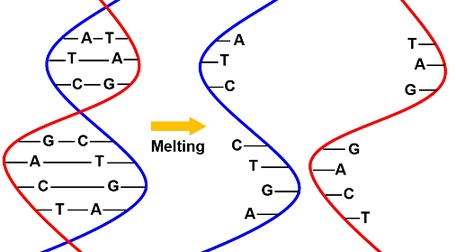Study Finds That Both SARS-CoV-2 Nucleocapsid Protein And NSP 13 Protein Are Able To Cause Human Host DNA Melting!
COVID-19 News - SARS-CoV-2 Nucleocapsid Protein - NSP 13 Protein - DNA Melting Jun 25, 2023 2 years, 6 months, 2 weeks, 6 days, 2 hours, 9 minutes ago
Past Study Findings Has Serious Implications About Long-Term Health And Medical Issues In Post COVID Individuals!
COVID-19 News: A past study conducted by researchers from Zunyi Medical University-China and Guizhou University-China, have led to alarming findings about the proteins of the SARS-CoV-2 virus. The study reveals that both the SARS-CoV-2 nucleocapsid protein and the nonstructural protein 13 (Nsp13) have the ability to cause the melting of human host DNA. However, what makes this finding truly remarkable is that these proteins exhibit different rates of DNA melting and also possess strand-annealing activities.

DNA melting in this context refers to the denaturation of the DNA and also the separation of the double strands in the DNA structure.
Various other
COVID-19 News reports had also shown that SARS-CoV-2 is able to cause damage to the human host DNA and telomeres.
https://www.thailandmedical.news/news/breaking-university-of-vermont-scientists-confirms-that-sars-cov-2-has-ability-to-damage-human-dna-and-telomeres-causing-long-covid-issues
https://www.thailandmedical.news/news/breaking-study-discovers-sars-cov-2-could-be-carcinogenic-as-it-causes-mutagenesis,-telomere-dysregulation-and-impairs-dna-mismatch-repair
https://www.thailandmedical.news/news/great-news-study-shows-that-sars-cov-2-protein-nsp13-is-able-to-cause-dna-damage-and-dysregulate-tumor-suppressor-gene-p53,-increasing-cancer-risk
https://www.thailandmedical.news/news/sars-cov-2-research-orf6-and-nsp13-proteins-cause-degradation-of-the-dna-damage-response-kinase-chk1-through-proteasome-and-autophagy
https://www.thailandmedical.news/news/breaking-brazil-researchers-validates-that-sars-cov-2-utilizes-human-host-protein-pcna-for-replication-while-dna-of-the-host-cells-are-damaged
But this is the first study to show the proteins of SARS-CoV-2 able to cause human host DNA melting.
The implications of this study are worrisome as it s
hows that SARS-CoV-2 infections can lead to lots of different long-term health and medical issues and even cancer.
With more evidence emerging about various medical conditions emerging in Long COVID and also the emergence of more cases of new onset of various cancers and also the progression of malignant tumors, more urgent studies are warranted on the effects of the SARS-CoV-2 virus on the DNA of the human hosts.
The SARS-CoV-2 nucleocapsid protein, which plays a crucial role in viral replication, was found to have a melting activity that is more than 22 times weaker than that of the Nsp13 protein. The melting process was observed to be independent of nucleoside triphosphates and magnesium ions (Mg2+), which are typically involved in DNA melting. Interestingly, the nucleocapsid protein showed a stronger ability to anneal single-stranded DNA at low concentrations, but promoted the melting of double-stranded DNA at high concentrations.
This insight into the behavior of the SARS-CoV-2 nucleocapsid protein has deepened our understanding of its functions and could pave the way for novel approaches to antiviral drug development. The nucleocapsid protein has been known to bind to viral RNA and play a critical role in viral replication and packaging. However, its interactions with host DNA have remained largely unexplored until now.
The study sheds light on the molecular mechanisms underlying SARS-CoV-2 pathogenesis and immune evasion, which are crucial for developing effective treatments against COVID-19. Despite the relatively low mortality associated with the disease, the virus continues to pose a significant threat to global health. Therefore, uncovering the secrets of its proteins and their impact on human DNA is of utmost importance.
SARS-CoV-2 belongs to the beta coronavirus family and is a positive-sense single-stranded RNA virus. Its genome contains 11 genes that encode approximately 20 functional proteins. Among these proteins, the Nsp13 protein has been widely studied for its role as a helicase, involved in unwinding the viral RNA during replication. The nucleocapsid protein, on the other hand, is responsible for binding to the viral RNA and is highly conserved among different coronaviruses.
The study team expressed and purified both the nucleocapsid protein and the Nsp13 protein and compared their DNA unwinding activities. They discovered that while the Nsp13 protein exhibited typical helicase activity, the nucleocapsid protein did not possess the characteristics of a typical helicase. Instead, it demonstrated a unique ability to open double-stranded DNA, resembling the behavior of single-strand binding proteins found in other organisms.
The study also revealed that the concentration of nucleocapsid protein required for DNA unwinding was much higher than that of the Nsp13 protein. This suggests that multifunctional proteins like the nucleocapsid protein may need to be present in higher concentrations in order to perform their various functions effectively. Given that the nucleocapsid protein is one of the most abundant viral proteins in infected cells, with concentrations reaching up to nearly 1 mM, its impact on host DNA cannot be underestimated.
The findings of this study have significant implications for our understanding of SARS-CoV-2 and the development of antiviral drugs. By uncovering the unique characteristics of the nucleocapsid protein and its impact on human DNA, researchers can now explore new avenues for therapeutic interventions. The nucleocapsid protein may serve as a potential target for drug development, and further studies will be crucial to elucidate its precise mechanisms of interaction with human DNA.
It's worth noting that while this study provides valuable insights into the impact of SARS-CoV-2 proteins on human DNA, more research is needed to fully understand the implications in the context of COVID-19. The clinical relevance of these findings and their potential translation into effective treatments for COVID-19 patients will require further investigation and validation through in vivo and clinical studies.
The study findings were published in the peer reviewed journal: Frontiers in Microbiology.
https://www.frontiersin.org/articles/10.3389/fmicb.2022.851202/full
For the latest
COVID-19 News, keep on logging to Thailand Medical News.
Read Also:
https://www.thailandmedical.news/news/breaking-news-even-asymptomatic-sars-cov-2-infections-cause-dna-methylation-and-epigenetic-changes,-leading-to-immune-dysregulation
https://www.thailandmedical.news/news/covid-19-news-university-of-queensland-led-study-shockingly-finds-that-sars-cov-2-infections-causes-dna-damage-to-heart-tissues
https://www.thailandmedical.news/news/breaking-university-of-queensland-study-discovers-that-sars-cov-2-actually-attacks-the-dna-of-heart-cells
https://www.thailandmedical.news/news/breaking-covid-19-news-sars-cov-2-infections-lead-to-cellular-m6a-rna-methylation-loss-in-host-cells-possible-implications-for-cancer-and-other-issues
https://www.thailandmedical.news/news/breaking-u-s-study-finds-that-sars-cov-2-infections-and-mrna-jabs-alter-dna-methylation-states-of-immune-cells-and-epigenetic-clocks-of-humans
